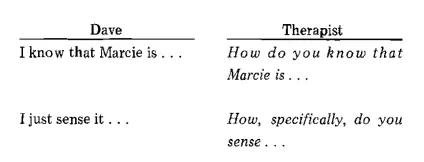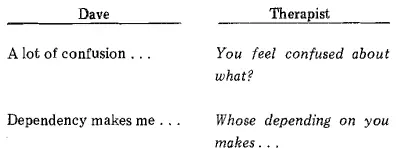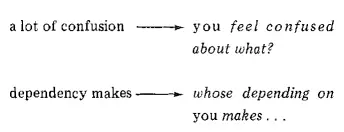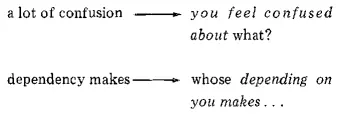
By systematically insisting that he be able to understand the messages from individual family members, the therapist is setting an example for clear communication as well as teaching the family members specific ways to clear up their verbal communication.
Therapist: Dave, what are you aware of right now?
Dave: I feel kinda tight . . . stomach flipping around; you know . . . when Marcie looks at me that way, I
feel kinda funny.
Therapist: Funny how?
Dave: You know, there's a lot of confusion . . . dependency makes me feel tight.
Therapist: You feel confused about what, Dave?
Dave: You know . . . dependency makes me feel confused . . .
Therapist: Whose depending on you makes you feel confused?
Human speech is one door to understanding between the speaker and the one to whom it is spoken. Understanding how human speech reflects this is an essential tool for therapists. We will, therefore, go into detail to show how this concept is illustrated in this interview.
There are several important patterns in this portion of the transcript. First of all, Dave has begun to use a language pattern known as nominalization. [7] The therapist's (or hypnotist's) ability to identify and gracefully use the verbal patterns of nominalization is one of the most powerful verbal intervention patterns of which we are aware. A fuller presentation of the uses of this pattern is available on pages 43-44 and 74-80 in The Structure of Magic, Volume I; and pages 162-164 and 229-231 in Patterns of the Hypnotic Techniques of Milton H. Erickson, M.D.
Nominalization is the name of the linguistic process by which people represent active portions of their experience by words which are usually used to represent the more static portions of their experience. Nouns are usually used to represent these more inert portions of our experience — chair, table, stove, mirror, etc. — while verbs are normally used to represent the more dynamic parts of our experience — running, jumping, watching, listening, etc. However, through the language process of nominalization, we represent the active portions of our experience in a static way. For example, in the following two sentences, both of the words in italic seem to function as nouns.
I see cats.
I see frustration.
The word cats serves to separate from the world of experience a particular type of animal, while the word frustration represents something quite different. Frustration is associated with the verb frustrate which sounds and looks very much like it and has a similar meaning. The verb frustrate is the name of a process by which someone/something is frustrating someone. Using the kind of visual representation we developed previously in our discussion of the linguistic process of deletion, we have,
FRUSTRATE (something/someone doing the frustrating, someone being frustrated)
So, when the therapist (or any native speaker of English) hears the sentence,
I see frustration.
he can, by checking his intuitions about the meaning, discover that there is more implied by the sentence than actually appears on the surface. Specifically, we have,

In the example we are presenting, the linguistic process of using a noun for a verb description (the process of nominalization) also includes the process of deleting the information associated with the original verb description.
In the transcript, Dave uses two nominalizations, confusion and dependency. As the therapist continues to try to comprehend the present family system and what its members want, he encounters these nominalizations. As is typical of nominalizations, so much of the material associated with the verb of process representation has been deleted that the therapist cannot fully understand Dave's communication. The following exchanges then occur:

Notice that the therapist is systematic in his responses; he identifies the nominalizations, and
(a) Turns the noun word back into a verb word:

(b) Assumes that Dave is one of the deleted parts of the nominalization:

(c) Asks for the other part of the nominalization which has been deleted:

There are two ways which we have found very useful in our work to systematically identify and challenge nominalizations in the communications of family members in the context of family therapy. First, people are unable to cope when they represent processes in their experience as events, static and fixed, having deleted most of the information about the parts which went to make up that process. If the missing something which they want in their lives is represented as a process with the parts of that process identified, then there is a possibility for them to act to influence and change the process to get what they want. Understanding how they arrived at the place in their lives where they are now helps them to identify the next step toward getting what they want for themselves. If, however, the thing they want is represented as an event with most of the pieces missing, they have little hope of influencing and changing it. They, literally, are victims of their representation. When the nominalizations are converted into process representations and the pieces of the process are identified, coping becomes possible. Dave feels confused about what he is to do when Marcie looks at him in a certain way. Understanding the specific process by which "a lot of confusion" is created is an important first step in changing it.
Secondly, when a family comes to us for assistance, they are usually able to agree that they seek some nominalization such as love, warmth, support, respect, comfort, etc., for themselves. However, unless the therapist is alert to connect these words with experience (de-nominalize these nominalizations), filling in the deletions, etc., for each of the family members, there is little hope that the individuals will be satisfied. In other words, since each family member regards a different experience as love, warmth, etc., these words connect with experience (de-nominalize nominalizations) differently for each of them. What one of them regards as warmth another may consider smothering. By systematically connecting words with specific experiences (de-nominalizing) with each of the family members, the therapist can identify the experience or set of experiences which all of the family members will be able to accept as fulfilling their desires and hopes for themselves as individuals and as a family. By de-nominalizing, the therapist establishes the experiences which will be satisfying for the family and which he can then work with them to create. These experiences constitute the desired state of the family system; they allow the therapist to compare what the family resources are at this point in time with what they will need to create in order to reach the state they agree upon (through the process of de-nominalization) as being appealing to them. By this process, a direction is established for the therapist and the family members to organize the experience of family therapy.
Читать дальше

















